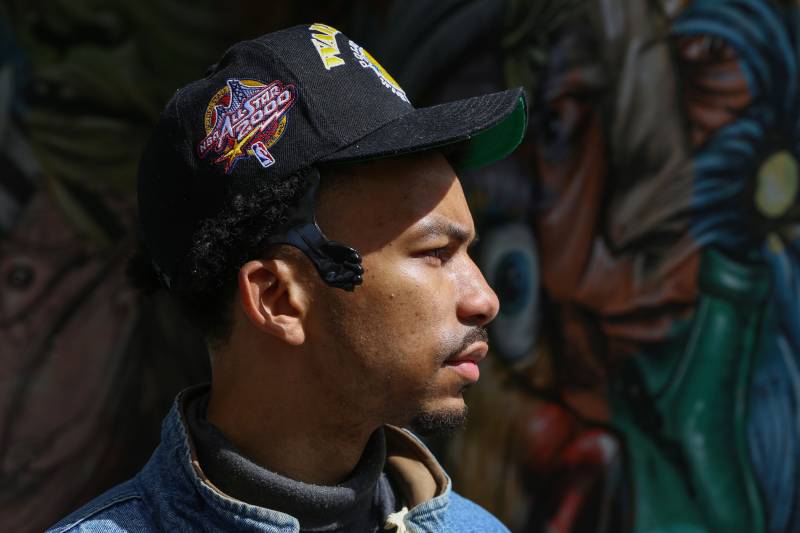Walking around 15th Street in Oakland on a Friday afternoon — past beloved eateries like Minto’s Jamaican Restaurant & Bar, Baba’s House and Hoza Pizzeria — reminds me of what makes the Bay Area such a vibrant, lively place to be.
The region is also struggling: we’ve made headlines in recent months for crime, the fentanyl crisis and other challenges. Many of those criticisms are arguably hyperbolized, or oversimplifications of social issues with systemic root causes. But there are undoubtedly real shortcomings that make it difficult for longtime residents, particularly creatives and working- and middle-class families, to thrive.
Personally, I’ve grappled with what it means to be from a place that doesn’t have many accessible spaces left, and I wonder about the psychological consequences of that daily erasure. It’s no secret that Bay Area cities regularly lead the nation as the most expensive zip codes in which to raise a family.
Michael Sneed — an East Oakland rapper, producer and vocalist — explores this reality on his latest EP, Junior Varsity Blues. The record is a poetic manifesto, colored by jaded grief about displacement and his changing community. But he doesn’t shy away from expressing his hometown pride, either. Having started rapping at age 15, the 24-year-old is now unlocking his vocal superpowers to share narratives about Black joy, personal malaise, reclamation, nostalgia and the importance of friendships amid the swirling chaos of tech-fueled capitalism.
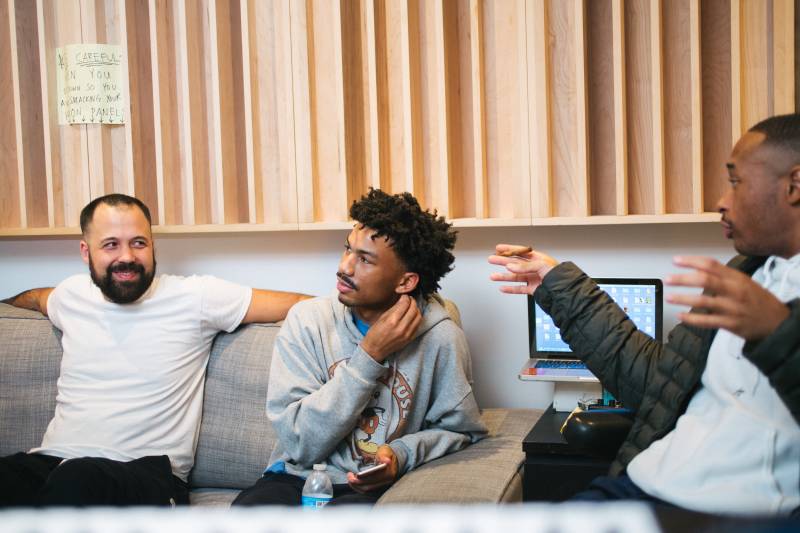
Sneed grew up in the 100s section of Deep East Oakland with his parents and older sisters. He lives on a block that is still predominantly Black, where close-knit families support each other. He’s fortunate, Sneed tells me. But for many lifelong Oaklanders, particularly Black, Latinx and Pacific Islanders, the city’s dramatic shifts have made it nearly impossible to remain.
It’s not news that the Bay Area’s inequities disproportionately affect the Black community. “The slow churn of the erasure of the region’s historic communities that birthed the Black Panther Party and raised the likes of Maya Angelou and Etta James is well underway,” writes Adam Mahoney, in a piece on climate reparations, reporting that the nine-county region’s Black population has decreased by 20% since 1990, while the total population has grown by 25%.
As we wander downtown Oakland, Sneed recalls the city he grew up in, and what he most misses about it: poetry slams and open mics for youth, Monta Ellis on the Golden State Warriors, and most importantly, his peers and friends who have had to move away.
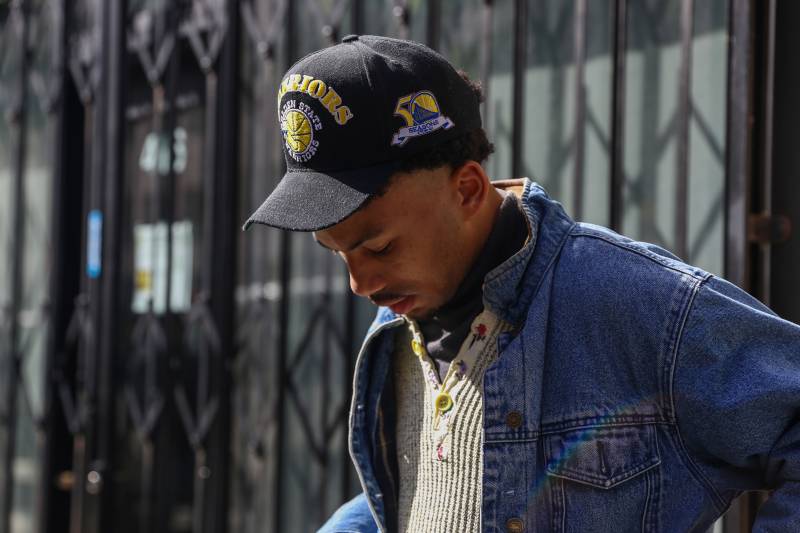
“No one has been immediately displaced in my family, but I’ve had peers who can’t find housing because it’s too expensive,” he says. “There’s no reason why there should be people houseless on freeways in tents. It shouldn’t be a thing. The whole purpose of having a government is to prevent that and to protect the people, especially if you have a government with as much money as the United States and California. There’s no reason.”
Following a song collaboration and high-profile tour with P-Lo, Sneed returned to The Town more attuned than ever to what makes the Bay Area simultaneously special and intolerable. A particularly poignant example of his gospel-inspired sound is “Paw Patrol,” accompanied by a music video filmed in his neighborhood that evokes a homely retro vibe.
Forced migration and gentrification are prevalent themes in his music, especially on tracks like “City,” which outline the rapper’s frustrations with houselessness and unaffordable rents. With a high-pitched voice that many have compared to Chicago’s Chance the Rapper, Sneed weaves in and out of intonations with a choir-trained precision that borders on falsetto, presenting a simple but profound question as the song’s hook: “Ayo the block don’t look the same as it used to, where my city go?”
Combined with deep reflections about his family’s health (most notably, the painful loss of his grandmother and aunt), the birth of his niece, playing basketball as a teenager, and criticisms of the tech industry, the seven-track project presents a layered portrait of a young, Black man who graduated from Howard University who is living as joyfully as he can under the crushing weight of Northern California’s demands. It’s a theme many local artists have explored in their music. But with Sneed, there’s a touch of theatrics and a goofy lovability that’s rare in East Oakland rap.
One of the album’s standout singles, “The Answer,” draws from the artist’s love of hoops (functioning as a reference to the iconic point guard, Allen Iverson, who was known as both A.I. and The Answer in his playing days) while expressing his flamboyance with clever wordplay: “When I was five I used to get in trouble for coloring out of the lines/ why if you colored they want you to stay in the line/ I feel like A.I. up in his prime.” The video, which is titled “the world’s first A.I. music video,” reached 16,000 views in one month (and no, it is not the world’s first A.I. music video).
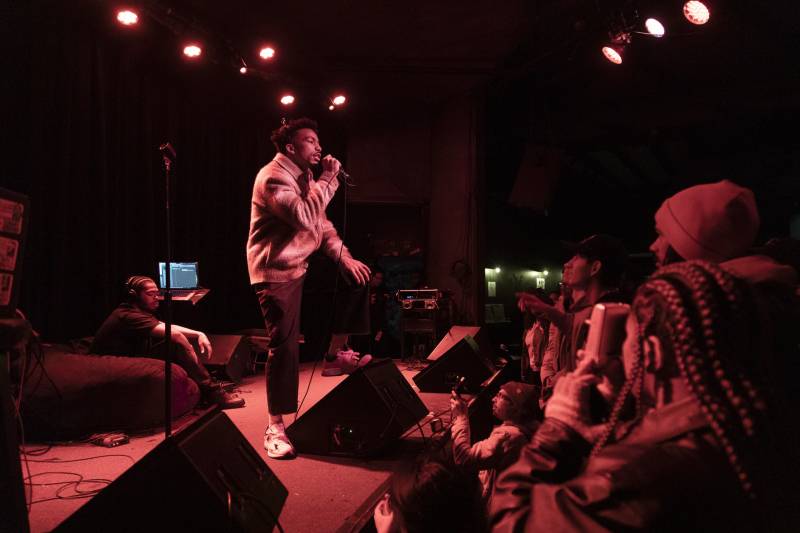
“I wasn’t thinking of artificial intelligence at all,” Sneed tells me inside The Hatch, a Black-owned bar in the city, while sipping on a non-alcoholic lemonade. “That song to me is kind of using Allen Iverson as this guy who did his own thing. He wore the baggy shorts, the gold chains. He said ‘I’m gonna be so hip-hop that it makes you uncomfortable.’ And he was almost punished because of that. [This song is about] using him, or his avatar, as a way to highlight Black men like that.”
“A.I. was so fearless and unapologetically himself and hip-hop, and it kind of gave athletes [and] people of the culture in general freedom to express themselves in spaces that aren’t necessarily hip-hop or basketball,” he continues. “That’s tight about him. I don’t think he gets enough props for that. In a way, he was postmodernist.”
Basketball is a major element of Junior Varsity Blues, with fictional skits of a team tryout peppering the 23-minute project. It’s the only sport Sneed grew up playing, and it’s how he bonded with his peers and family members. For an artsy kid, it gave him an unexpected outlet.
“Even though I wasn’t good, it was important to me,” he admits. “I was always daydreaming, never paying attention. I dressed goofy. I showed up [to play basketball] in church socks. But it’s how I met a lot of friends in high school.”
With his younger twin cousins recently entering the NBA as nationally touted prospects, Sneed appreciates what athletics can provide for a community. But he doesn’t overly glamorize the sport, either. His music regularly veers into his more niche interests — like anime (which his Nickelodeon’s Avatar-inspired tagline, “Yip! Yip!” makes clear in every verse) and Broadway musical productions like The Lion King and Wicked (his EP features a song titled “WICKED”).
Despite his introspective nerdisms, though, it’s not all “Hula Hoop” and “Hopscotch” games for Sneed. Beyond the lighthearted inner child hardwired into his raps, his songs inevitably return to heavy subject matter, like contemplating the death of Black Panther Party leaders, having emotional withdrawals while withdrawing money from the bank and losing faith in God over slow-paced, self-produced instrumentals. Songs like “It’s Impossible! It’s a Miracle!” serve as cathartic hymnals, presenting the rapper in his most vulnerable state as he rattles off a litany of impossible life challenges.
“There was so much adversity [at the time of writing the song]. Mending felt like it would be a miracle,” Sneed says. “I’m only myself because of how hard things can be. I need someone to tell me it’ll be alright. I’m always trying to put that in my music. It’s really just me speaking to myself. If my words can help someone else through those tough Monday mornings, then alright. That’s powerful. It’s to help me, and to help others.”
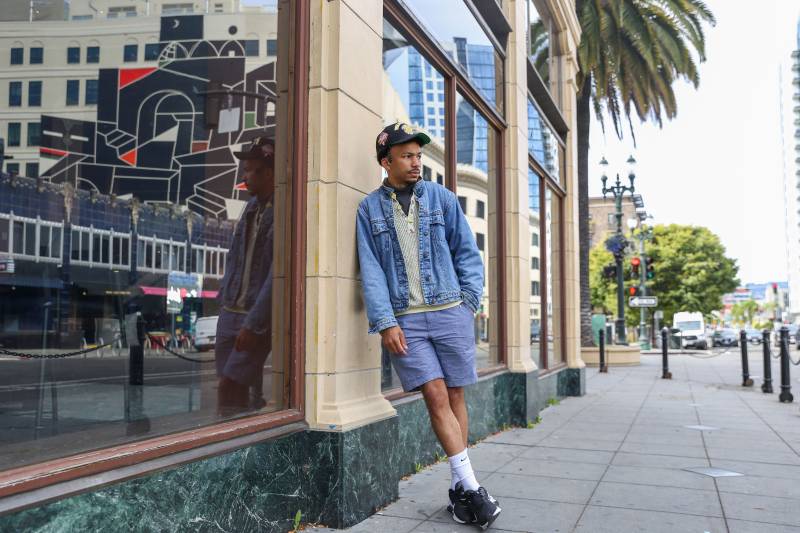
Currently an unsigned artist, the ascendant Oaklander is considering a move to Los Angeles, where other successful East Bay artists like Kehlani, G Eazy and P-Lo have already relocated. It’s relatively common for Bay Area artists — particularly rappers — to leave the Bay. There’s a cross-national migratory route to Atlanta that has been popularized by Too $hort and Iamsu!. And, of course there’s New York City, which is the current residence of Rey Resurreccion and serves as a part-time getaway for Ovrkast., one of Sneed’s best friends and closest collaborators. It’s a phenomenon that KQED’s Pendarvis Harshaw once dubbed “the role of the Bay Area expatriate” in music.
Even if Sneed can’t afford to remain in his city of birth, or feels like artistic opportunities are greater elsewhere, he plans to stay connected to his home in the East Bay. He’s done it before, when he left Oakland for Washington D.C. to attend university, then came back. The temporary move expanded his sense of self and place, bolstering his appreciation — and complex understanding — for his return.
Regardless of wherever Sneed lands, he’ll take East Oakland with him. As he declares on “WICKED,” “I’m not a vibe, I’m a symbol to my city.”

Michael Sneed’s ‘Junior Varsity Blues’ is available on all streaming platforms. His recent tourmate, P-Lo, will be at STUNNA’s Shop at Stashed SF (2360 3rd St., SF) on Sat., July 15 from 4 – 8 p.m.
